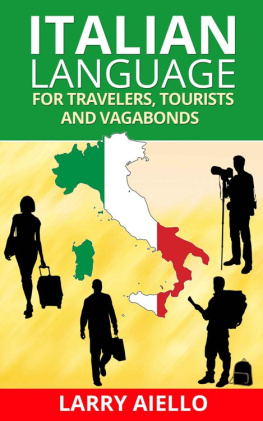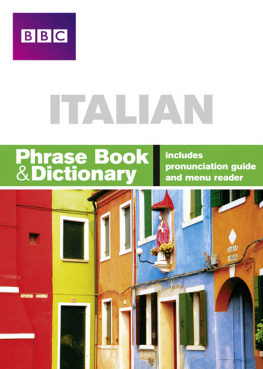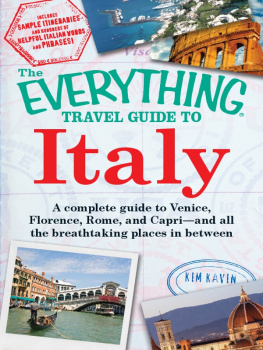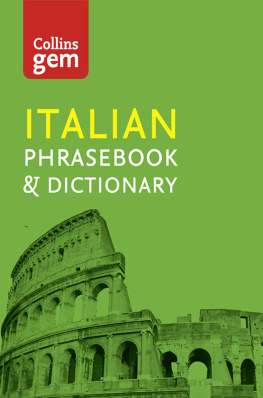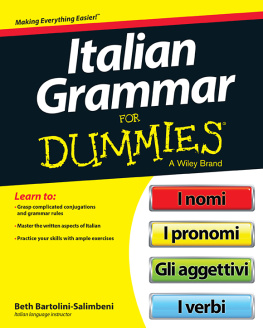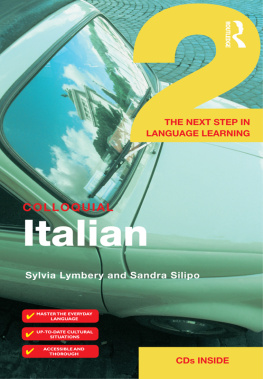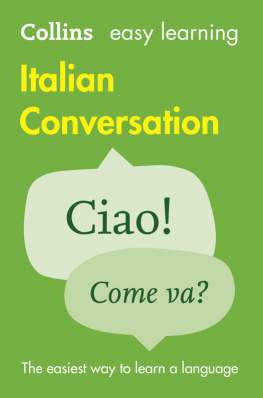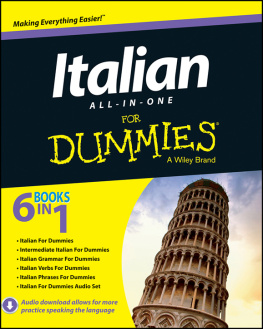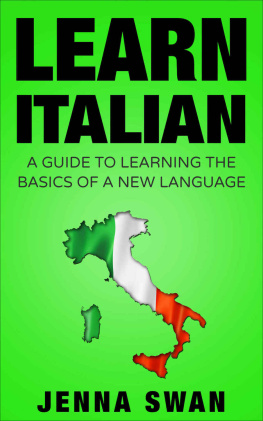Italian Language For Travelers, Tourists And Vagabonds By Larry Aiello http://www.CoolBooksByLarry.com Copyright Nov 2013 Copyright and Disclaimer Italian Language for Travelers, Tourists and Vagabonds Copyright and Disclaimer Copyright 2013: Larry Aiello, Addicted2Italy.com Published: November 2013 The right of Larry Aiello to be identified as author of this Work has been asserted by him in accordance with sections 77 and 78 of the Copyright, Designs and Patents Act of 1988. All rights reserved. No part of this publication may be reproduced, stored in retrieval systems, copied in any form or by any means, electronic, mechanical, photocopying, recording, or otherwise transmitted without written permission from the publisher. This book is licensed for your personal enjoyment only. This publication may not be resold or given away to other people for free. If you would like to share this book with another person, please purchase an additional copy for each recipient.
Find out more about the author and upcoming books online at http://www.Addicted2Italy.com DISCLAIMER OF WARRANTIES The material in this book is published as a guide only and I believe that the information is materially correct based on my own experience, research, and diligence. I do not accept any responsibility for any error or omissions or for any damage or loss incurred by any person(s) directly or indirectly due to reliance on such information. The information presented is based on my own unique experiences. Users of this guide are advised to do their own due diligence when it comes to making decisions regarding learning Italian and all information, services, and products that have been provided or illustrated should be independently verified. Your particular situation may not be exactly suited to the examples illustrated here; in fact, it's likely that they won't be the same, and you should adjust your use of the information and recommendations accordingly. Also, changes in circumstances after the time of publication may impact the accuracy of the information.
In addition, there are links to outside services and vendors that have been provided as a convenience to the user. I cannot control nor guarantee the accuracy, relevance, timeliness, or completeness of this outside information. However, at the time of this writing, the links point to organizations that I have either personally used and recommend, or would recommend without hesitation to my own family and friends. Photo Attributions: Common Expressions Sign by Glenn Harper on Flickr Passport Public domain work by Christopher Elison on Flickr Alitalia plane: Adrian Pingstone, April 2007 - public domain Train: Public domain photo by StuporesMundi Boat: Public domain work by Cap. E. Patalano Car: By S 400 HYBRID (Self-photographed) [Attribution], via Wikimedia Commons Currency: By Robert Kalina [Public domain], via Wikimedia Commons Colors Paintbrush: Commercial photographer Enrico Rubicondo, Palermo and Paris phone +39 386218644 Contents About Me Benvenuti! Welcome, and thank you for purchasing my book.
I grew up outside of New York City and now live in Florida. I have traveled through Italy extensively, spending many summers as a boy, and I now try to get back as often as I can. I love to share my knowledge with others about the language, culture, and beauty of Italy. I also from time to time enjoy teaching Italian to those who want to learn in person in the Tampa Bay area, and the proceeds benefit a local charity that I am involved with. You can see some of the reviews here: http://www.addicted2italy.com/goto.php?link=italian-classes-tampa Italian Pronunciation One of the beautiful things about the Italian languagebesides the soundis the relative ease with which one can pronounce the words. Everything is pronounced exactly as it is written.
In other words, it is a phonetic language. Once you know the rules of pronunciation youll be able to read and speak Italian in no time. For all practical purposes learning to read and speak Italian should take the amount of time it will take you to memorize the next few pages. For most people it should be less than an hour or two. Thats rightyoull be able to speak and read Italian in less than an hour or two. You wont comprehend what the heck you are talking about, but youll be able to do it.
The reason is that there are no exceptions in the Italian language when it comes to phonetics. In English there are many exceptions. And that means you have to memorize those exceptions to take into account every possible phonetic combination or possibility in order to truly pronounce the word properly. Lets look at an example. I remember this from my linguistics professor back in my younger days at the University of Florida. How would you pronounce the following word in English? GHOTI (g-h-o-t-i) Most people would pronounce it similar to the word goatee, which refers to facial hair around a mans chin and moustache area.
Or you can pronounce it the same way as goatee, but with the accent emphasizing the first syllable, as in GO-tee. It wouldnt be farfetched for some people to pronounce it the same way as the infamous New York City mobster John Gotti (aka the Teflon Don). What if I told you that in the English language you could also pronounce this as fish , as in a fish you can eat, like a salmon or a trout? Heres how you can accomplish that in English. GH these first two letters can be pronounced as the f sound in fish because gh can have that same pronunciation as in rou gh . O this letter can be pronounced as the i in fish, similar to the same pronunciation that an o has in the word w o men. TI these last two letters can mimic the sh sound in fish similar to the ti combination that is found in na ti on.
Thats how you can get fish out of ghoti. As you can see, English has a lot of inconsistencies and irregularities in regards to its pronunciation. And thats because weve had a lot of different influences on our language that have bastardized it, for lack of a better term. Luckily for you, Italian does not have those bastardizations when it comes to pronunciation. Accent Emphasis Stress The only thing that CAN sometimes change is the placement of the emphasis (stress), or the accent of a multi-syllable Italian word. Most of the time the stress will fall on the second to last syllable , also known as the penultimate syllable.
This is similar to Spanish and it gives both languages a very rhythmic sound. Sometimes the emphasis can fall on the last syllable . Usually that is indicated with an accent on the last letter, such as: Universit This five-syllable word for university will have a strong emphasis on that final sound. In this case we are lucky because there is an accent mark on the that alerts you to place the emphasis on that syllable. Sometimes the emphasis can fall on another syllable . Usually, there is no accent to guide you along in this case.
Native speakers will know where the emphasis should fall based on practice, custom, and experience. Lets look at the following two names: Mario Maria The masculine M a rio has emphasis on the A . Whereas the feminine Mar i a has the emphasis on the I . The feminine Maria follows the normal pattern of using the penultimate syllable. The masculine Mario does not. Note that there is no accent symbol on Mario.
The Italian Alphabet a pronounced as ah as in f a ther (ah) b pronounced the same as bumble bee (bee) c pronounced like tai chi (chee) d pronounced like Billy Dee Wiliams (dee) e pronounced like the e in g e t (see note below) (eh) f pronounced EFF-eh (effe) g pronounced like g -string (gi) h pronounced AH-cah (acca) (see note below) i pronounced like the double e sound in ee l (ee) l pronounced EL-eh (elle) m pronounced EM-eh (emme) n pronounced EN-eh (enne) o pronounced like oh (see note below) p pronounced like you have to take a pee (pi) q pronounced coo like a coup d'etat r pronounced EH-reh (rs are rolled in Italian) s pronounced ES-eh t pronounced tee like a tee pee u pronounced oo similar to f oo l v pronounced voo as in voo doo z pronounced ZEH-tah like the beautiful Catherine Zeta -Jones What did you notice from this alphabet? You probably noticed that there are some letters that are missing. The ones that are missing are: j pronounced ee LOON-gah (i lunga meaning long i) k pronounced KAH-pah (cappa) (see note below) w pronounced DOH-pya voo (doppia vu meaning double v) x pronounced eeks as in ch eeks (ics) y pronounced EE-pseh-lohn (ipsilon) (see note below) These letters do appear in words that are part of the Italian language but the words are derived from foreign origin. Taxi, for example, is technically a word in Italian. You will find it in every Italian dictionary and it is very much understood as a common everyday word. But technically, the letter X is not part of the Italian language. Note: With regard to the letter e there are parts of Italy where it will sound more like the ay in the word d ay .
Next page
